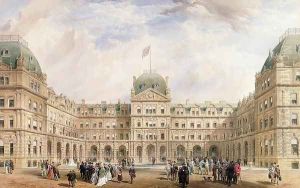Thomas Wyatt Wyatt Paintings
Sir Thomas Wyatt was an English poet, courtier, and diplomat during the reign of King Henry VIII. Born in 1503 at Allington Castle in Kent, England, Wyatt was not only a significant figure in the early Tudor court but also widely recognized as one of the pioneers of the English sonnet, bringing the forms and themes of the Italian Petrarchan sonnet to English literature. His father, Henry Wyatt, was a wealthy landowner and a loyal servant to the Tudor monarchs, which helped establish a privileged position for his son.
Wyatt's education likely began at home, in the typical fashion for a young man of his status, before he went on to study at St John's College, Cambridge, where he received a degree. He was quickly absorbed into court life, where he served in various diplomatic and administrative roles. This included embassies to Italy and other parts of Europe, where he was exposed to the work of Italian poets like Petrarch, whose influence would become evident in his own poetry.
As a courtier, Wyatt was part of the turbulent and often dangerous political environment of Henry VIII's court. He is rumored to have been romantically linked to Anne Boleyn before she became queen, and his close connection to her put him in a precarious position when she fell from favor. Indeed, Wyatt was imprisoned in the Tower of London on charges of treason but was later released, likely due to his value as a diplomat and possibly because he had not actually conspired against the king.
Apart from his political life, Wyatt's poetic contributions were significant. He is credited with introducing the sonnet form to English literature, along with Henry Howard, Earl of Surrey. Wyatt's poems were circulated in manuscript form among the court but were not published during his lifetime. It was only after his death that his sonnets and other works were published. His themes often dealt with the trials of courtly love, the pains of rejection and unrequited love, as well as the contemplation of morality and the transitory nature of life.
Wyatt's career as a court official continued to prosper until his death. He undertook a number of diplomatic missions for the king and was knighted in 1535. His final diplomatic mission was to the court of Emperor Charles V in Spain. Unfortunately, Wyatt's health deteriorated during this trip, and he died of a fever on his way back to England in 1542 at the age of 39. His legacy, however, has lived on through his poetry, which has been recognized for its innovative and transformative impact on English literature.
